Sgt. Maj. of the Army Michael Weimer has spent most of his career in some of the Army’s most elite special operations units, training for and fighting America’s wars in Iraq and Afghanistan.
Now, as the Army’s senior enlisted soldier and one of the service’s most visible leaders, Weimer’s focus has not changed.
“We’ve got some tough, tough times ahead of us with decision-making and resource allocation and how we shape the Army to be able to be ready, like really ready,” Weimer said. “So, where am I going to focus? It starts with warfighting. It goes to being able to project ready forces, and it’s a continual state of transformation.”
Working closely with Army Vice Chief of Staff Gen. Randy George, who has been nominated to be the next Army chief of staff and whose top focus area is warfighting, Weimer said achieving and sustaining that level of readiness is not easy or quick. “It’s a mindset,” he said.
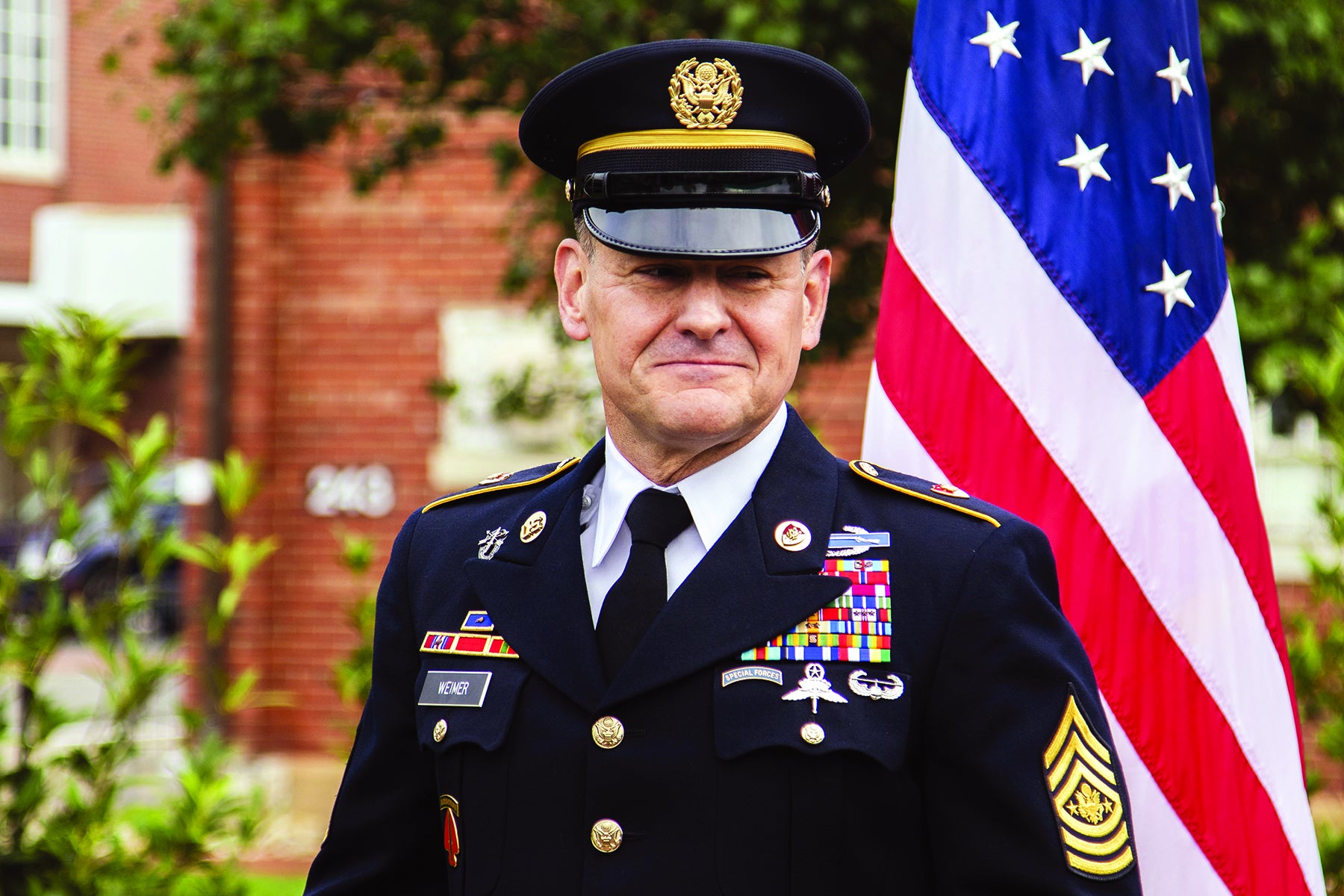
Additionally, the Army is grappling with a significant transition within its ranks. “What I’ve observed is a transition from a continual state of war … to transition back to more of a peacetime Army,” he said. Today’s Army includes leaders like Weimer, who served during the global war on terror but also in the 1990s. “I remember the peacetime Army,” Weimer said. “It was a different kind of readiness. We had an adversary. We studied that adversary, and we trained to be ready if called upon to fight that adversary.”
Then there are the leaders who joined after the 9/11 attacks. “They came right into it, right off the street, into a country at war,” Weimer said. The notion of a so-called peacetime Army “is new for them … and that’s important to acknowledge,” Weimer said.
Finally, there’s the new generation of soldiers, those who have joined recently, who “don’t know any of the global war on terror,” Weimer said.
“I think that’s some of the tussle that we’re seeing right now,” he said. “It’s a bit of a transition.”
Despite those differences, Weimer said he’s not overly concerned, noting that the fighting in Ukraine has been a uniting force for the U.S. Army. The war is “horrible,” and “I’m proud of how the Ukrainians are fighting right now,” Weimer said. “But it has really been the hand in front of your face of, no, this is real. We have to be prepared. We have to get our doctrine right. We’ve got to get our modernization priorities right. We’ve got to get our leader development right.”
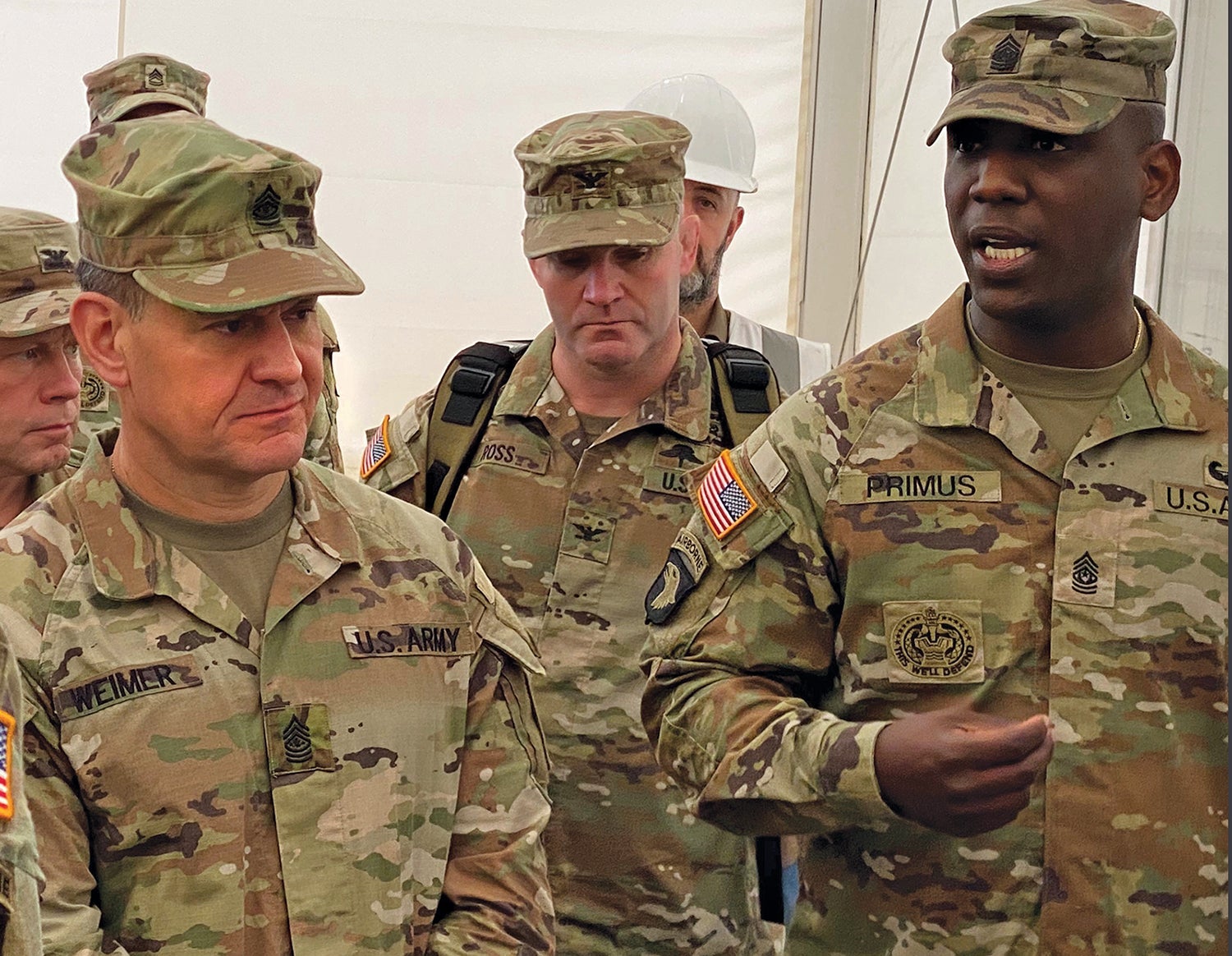
Growing Up Green
Weimer was sworn in as the 17th sergeant major of the Army on Aug. 4, succeeding Sgt. Maj. of the Army Michael Grinston. Most recently the senior enlisted soldier for the U.S. Army Special Operations Command, Weimer was an Army brat, moving multiple times during his youth, including spending nine years in Europe, while his father served in the Army for almost 27 years.
Weimer enlisted in 1993 and earned his Green Beret in 1996. He served tours with the 7th Special Forces Group (Airborne) and spent nearly 20 years in special mission units, deploying to combat multiple times.
As sergeant major of the Army, Weimer is the Army chief of staff’s adviser on matters affecting the enlisted force, spending much of his time traveling throughout the Army to observe training and meet with soldiers and their families.
Making the leap from special operations, where he often operated in secret, to serving as one of the most visible leaders in the Army has been an adjustment. This was driven home when one of his daughters, a cadet at the U.S. Military Academy at West Point, New York, pointed out that his photo is on every floor in every hall and in every barracks. “It’s weird for me,” Weimer said. “How is it not weird for her?”
“I spent all my time in a place where you stay off the radar, and then it became a place where you were completely off the radar,” Weimer said. “And now I’m back to being me, fully. Me and my kids joke about how we can post family vacation pictures on Instagram.”
Weimer credits Grinston for helping prepare him for the challenges of the job. “I’m incredibly grateful because I was able to hit the ground running, and instead of it being a complete vertical climb—it’s still steep, don’t misinterpret what I’m saying—but it’s much more tolerable now,” Weimer said.
As he adjusts to his new role, which includes a lot of selfie requests from soldiers, Weimer comes to the job at a pivotal time for the Army. The service is in the middle of a sweeping transformation, its largest in 40 years, as it works to develop leap-ahead
capabilities and update its doctrine to prepare for large-scale combat operations. It also is grappling with a severe recruiting shortfall that Army leaders say will take years to overcome and some fundamental changes in how the Army attracts and keeps talent in its ranks.
The force remains busy at home and abroad, with operations in Europe and the Indo-Pacific demanding the most attention. The operations tempo is high, while the force is not getting any bigger.
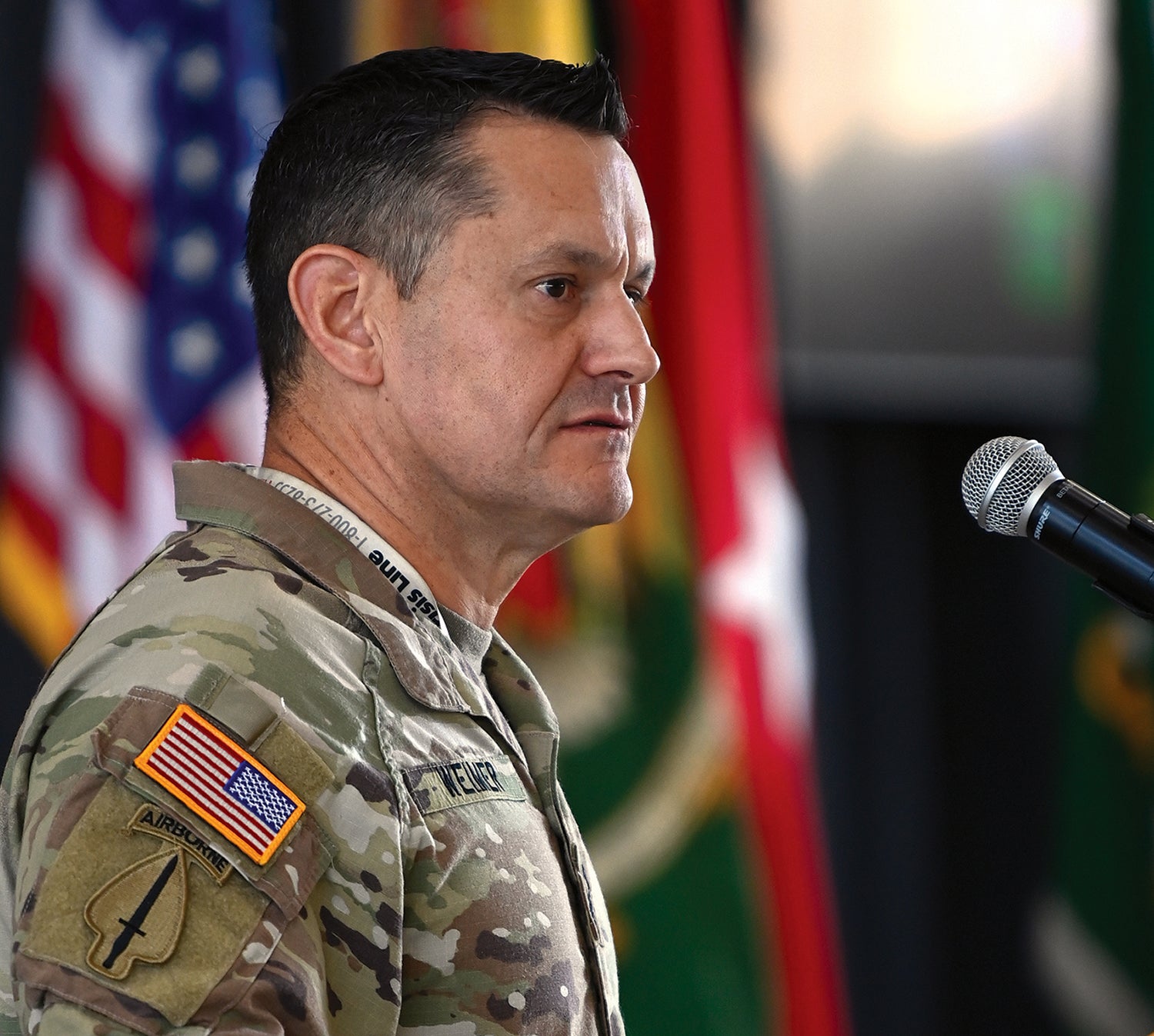
Focused on Fundamentals
Faced with these challenges, Weimer believes there’s a simple place to start, and that’s with the basics.
In his first message to the force as sergeant major of the Army and in troop visits since, Weimer has called on soldiers to cultivate what he calls a brilliance at the basics. “What are the fundamental basics that are no-fail for you that you have to bring to whatever commander you’re working for?” Weimer said. “Those are the things you absolutely have to be really good at.”
Soldiers can’t rely on a piece of equipment to make up for their shortcomings or make excuses for why they’re not keeping up with their basic skills, Weimer said. “When we talk about a warfighting culture, change really starts happening at that lowest level,” Weimer said. “We can talk about change all day long in the Pentagon, but, really, it’s the leaders at echelon that have to lead that change.”
Every soldier must hone their skills, Weimer said.
“It doesn’t matter if you’re a vet tech or whether you’re a cook or whether you’re a logistician or a truck driver. You’re a warfighter, and you have a purpose in a warfighting culture.”
Being a good teammate is also critical. “You can’t be a good warfighter if you’re not a great teammate,” Weimer said. “It just doesn’t work … because there’s huge consequences for not being good at what somebody was counting on you to be good at.”
For NCOs, the challenge is even greater, Weimer said. “Being a noncommissioned officer should feel like a heavy weight,” he said. “There’s a lot of responsibility. We say the noncommissioned officer is the backbone of the United States Army, and it’s the envy of all the other militaries in the world, so I think we’re obligated to make sure that we gird that up and really transform into what we need it to be as we move forward.”
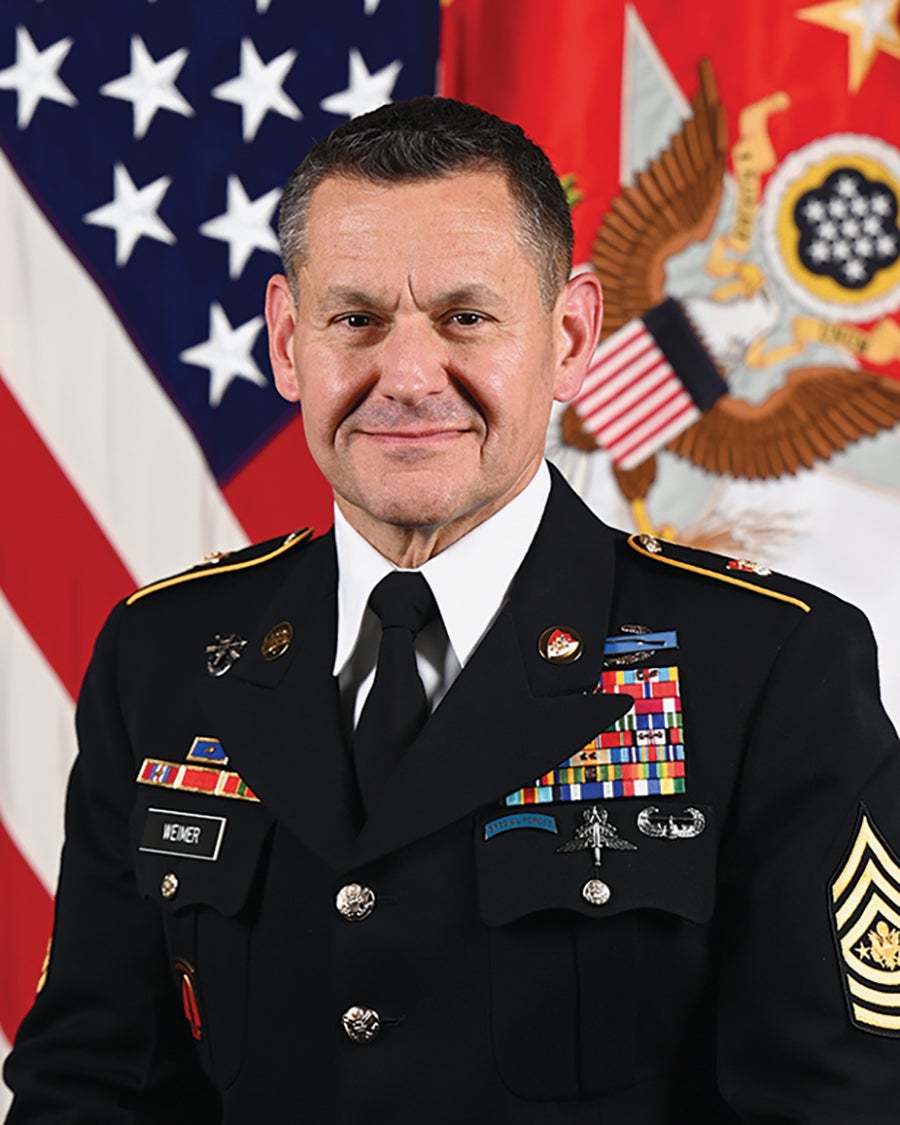
Maintaining Discipline
Standards and discipline are another important piece to building a warfighting culture, Weimer said. “It’s a fundamental basic across all MOSs,” he said. “If you lack personal discipline, you lack team discipline, you lack squad discipline, you lack company discipline, and it just goes up every echelon.”
In turn, soldiers must have the personal courage to correct someone else when they’re not meeting the standard, Weimer said. “It takes personal courage to stop somebody when they’re doing something they shouldn’t be doing,” he said.
NCOs must take time to coach, teach and mentor their soldiers, Weimer said. Young soldiers today are curious, and they want to know why they’re being asked to do something, he said. “I actually say this generation’s a lot smarter than my generation because they want to know the why,” Weimer said. “They’re going to research the why. They’re incredibly curious. They’ll look it up before you can tell them. Curiosity’s a good thing. That’s a key to critical thinking.”
To connect with young soldiers and keep them interested in serving, NCOs must be empathetic but also explain why things are being done a certain way. “If soldiers feel they’re cared for, they’ll take course correction all day long,” he said.
They also will be receptive to leaders who model what right looks like. “If you’re going to enforce standards, you have to be the standard,” Weimer said. “That’s hard in this day and age, because you’re on the X all the time.”
Leaders can’t be perfect all the time, Weimer said. “So, at least being consistent and then being humble enough when you mess something up, I think actually buys credit with this generation,” he said.
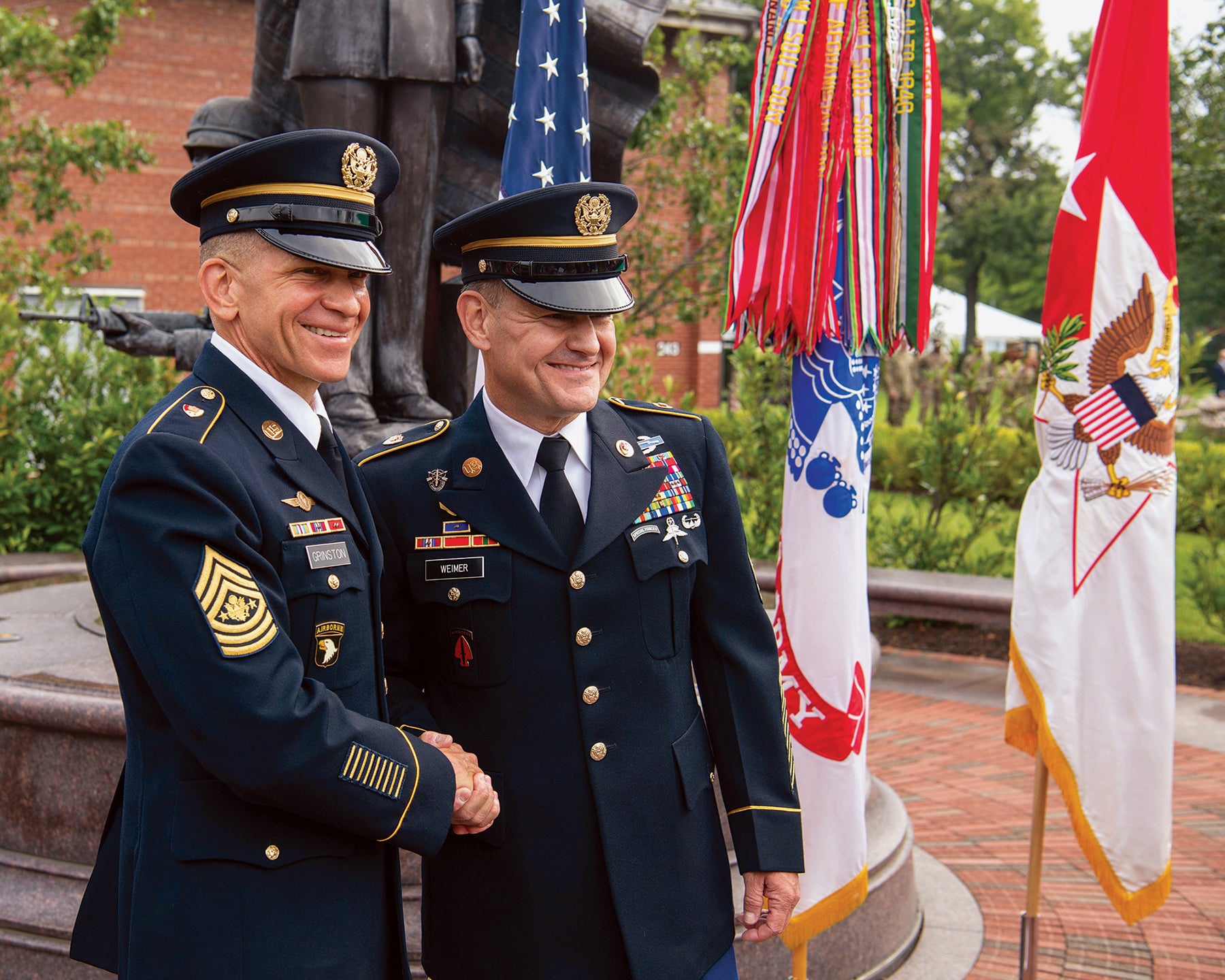
Valued Teammates
As he looks ahead, Weimer said he’s concerned about retaining talent, particularly as the Army struggles with recruiting. Quoting former Army Chief of Staff Gen. James McConville, Weimer said, “We’re in a constant war for talent, so how do we retain our talent, and how do we make sure people know they’re valued?”
Part of that effort means providing soldiers with good quality of life. “Do they deserve proper barracks? Of course, they do. Do they deserve housing? Of course, they do,” Weimer said. “Do they deserve absolutely all the quality-of-life things? Absolutely. But it takes time.”
Recruiting also is a challenge, and Weimer said he is focused on reconnecting the Army with the communities and nation it serves. “You’re watching us … open up, bring the community on base for functions, but also bring the base and the soldiers out to the community,” he said. “I told a group the other day, I said, ‘Hey, we’re your Army. We’re you. Please come learn your Army from us.’”
As the Army works through its challenges and builds a warfighting culture, Weimer said the force must remain consistent. Soldiers must not forget the “very reason we exist,” Weimer said.
“The only reason we exist is to be the premier warfighters the world has ever seen,” he said. “To do that, you have to be a good teammate. You’ve got to take care of your family. You have to actually develop yourself. You’ve got to have the right leaders. You’ve got to have the right equipment.”

